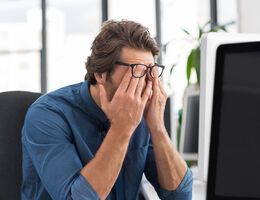Health library
Back to health libraryHow to survive the day after a sleepless night

July 28, 2025—Sleepless nights happen. So do busy days. If you're short on sleep, these tips from the American Academy of Sleep Medicine, Sleep Foundation and other experts can help you maintain your energy and focus.
Caffeinate strategically. If you're not a regular caffeine drinker, grabbing a single cup of tea or coffee can temporarily make you more alert and productive. Avoid drinking more than that so you don't "crash" or get a headache when the caffeine wears off.
Also, drinking too much caffeine or drinking it within 8 hours of your bedtime can interfere with your next night's sleep.
Try power naps. Keep them short, though—under 30 minutes. Snoozing longer can make you feel groggy when you wake up. Drinking caffeine just before your nap may help you wake up fresher if you sleep longer.
Get moving, or take a microbreak. A short walk, jog, bike ride or stretching routine that gets your heart pumping can really help. It doesn't have to be long. A few minutes can make a real difference. A shower with 30 to 90 seconds of cold water at the end will really perk you up too.
Choose light, healthy meals. It's common to crave higher-calorie and more sugary foods when you're sleep-deprived. But high-calorie meals with fats, processed sugars and starches can spike your blood sugar and make you sleepy. Avoid sweets, juices, sodas and white bread.
Instead, start your day with a nutritious breakfast of protein, whole grains, fruits and veggies, and low-fat dairy products. A light lunch and dinner should include lean protein, healthy fats (omega-3s) and complex carbohydrates to keep your energy up.
Snack smart. If you need an energy boost between meals, have a piece of fruit or some cut-up veggies with a healthy protein, like fish, lean meat, beans, or a small amount of seeds or nuts.
Go for bright light. Reset your body's internal clock by getting into the sunshine or spending 30 minutes in front of a light box. That'll reduce fatigue, especially after a meal.
Don't drive tired. Sleep deprivation causes up to 6,000 car crashes a year, warns the Sleep Foundation. If you're very sleep-deprived, caffeine may not be enough. Cold air, food and listening to music haven't been proven to help—but a 20-minute nap can. Even better: Catch a ride with a friend or co-worker, take public transportation, or reschedule your trip entirely.
Get help for chronic sleep concerns
These tips can help you cope with fatigue from an occasional sleepless night. But if you often have insomnia or feel a lot of daytime fatigue, it's time to take our sleep self-assessment—and share the results with your doctor. Dealing with the underlying cause could help you regain your energy.
Sources
- American Academy of Sleep Medicine. "Navigating Caffeine's Effects on Sleep and Alertness." https://sleepeducation.org/navigating-caffeines-effects-on-sleep-and-alertness .
- American Academy of Sleep Medicine. "Prioritizing Sleep & Managing Fatigue." https://aasm.org/wp-content/uploads/2021/05/Prioritizing-Sleep-and-Managing-Fatigue.pdf.
- Sleep Foundation. "Here's Why You Get Sleepy After Eating." https://www.sleepfoundation.org/nutrition/why-do-i-get-sleepy-after-eating.
- Sleep Foundation. "How to Stay Awake." https://www.sleepfoundation.org/sleep-faqs/how-to-stay-awake.
- Sleep Foundation. "How to Wake Up Easier." https://www.sleepfoundation.org/sleep-faqs/how-to-wake-up-easier.
- Sleep Foundation. "Sleepless Nights: How to Function on No Sleep." https://www.sleepfoundation.org/sleep-deprivation/how-to-function-after-sleepless-nights.
